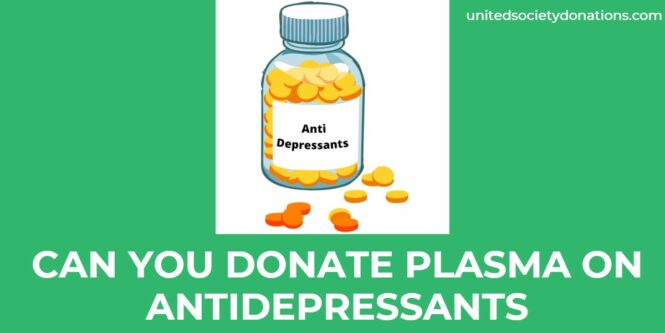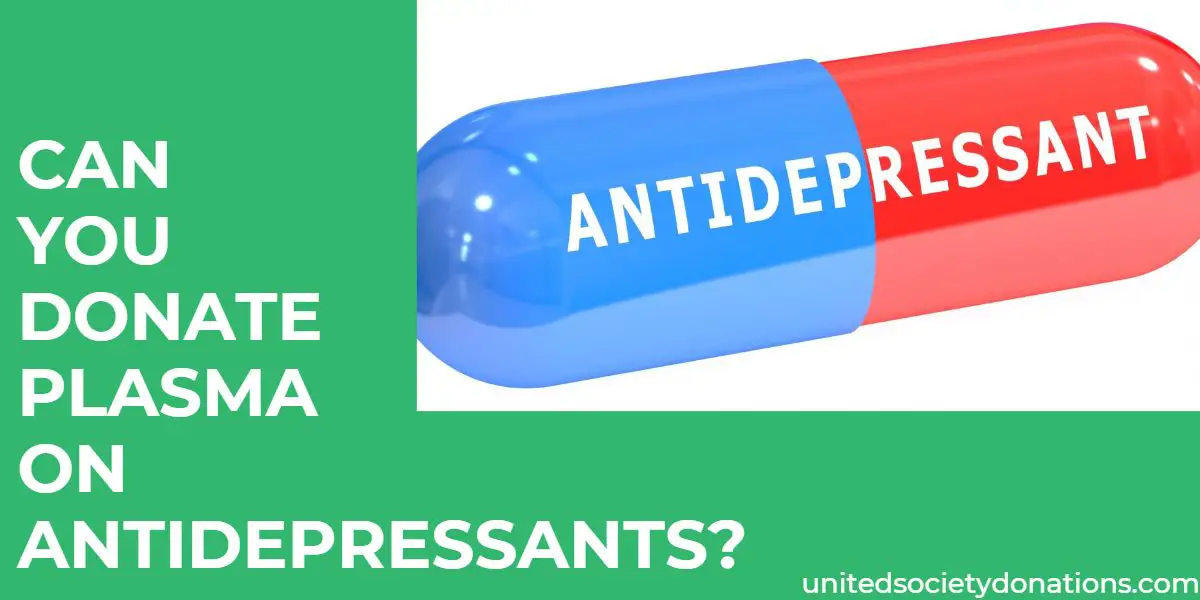
Ever considered donating plasma while on antidepressants? Unsure if it’s possible?
I faced this dilemma myself while on medication Through research and discussions with my doctor, I discovered the complexities surrounding this issue.
In this article, I’ll share what I’ve learned about the topic “Can You Donate Plasma On Antidepressants?” and provide some valuable teachings from my doctor.
Can You Donate Plasma On Antidepressants?

You can donate plasma while taking antidepressants. However, traces of the medication may still be present in your blood plasma.
This can potentially impact the quality and safety of the donated plasma, but this will depend on the specific antidepressant and the amount present in the plasma.
If you are a person that goes to the gym, check out this article on Does Donating Plasma Affect Muscle Growth.
How do Antidepressants Affect Plasma Donation?
Antidepressants can also affect plasma donation in several ways, including altering the levels of plasma proteins, regulation of blood pressure, drop in iron levels, and increasing the risk of bleeding and fainting. Different classes of antidepressants, such as SSRIs and TCAs, can have different effects on plasma donation.
Did you know you can receive up to 1000 dollars by donating plasma? I you are interested, check out this article on how to receive CSL Plasma 1000 Bonus.
Types of Antidepressants and How They Might Affect
Some medications and particular medical conditions are bound to prevent an individual from donating plasma temporarily. Even antidepressants vary and each of these types reacts differently to different patients.
The following antidepressants can have an impact on plasma donation:
1. Tricyclic Antidepressants (TCAs)
Blood pressure management can be significantly impacted by tricyclic antidepressants (TCAs), such as amitriptyline and imipramine, and plasma donation may cause additional changes in blood pressure levels. Additionally, these drugs may make you sleepy, which could make it difficult for you to complete the plasma donation procedure.
2. Selective Serotonin Reuptake Inhibitors (SSRIs)
Although selective serotonin reuptake inhibitors (SSRIs), such as fluoxetine and sertraline, have a decreased risk of interfering with blood pressure control, they can temporarily drop the medication’s levels in blood plasma, which could lead to the recurrence of symptoms.
3. Monoamine Oxidase Inhibitors (MAOIs)
When administered to plasma donors, monoamine oxidase inhibitors (MAOIs), such as phenelzine and tranylcypromine, can have a considerable effect on blood pressure control.
4. Atypical Antidepressants
Antidepressants like bupropion and mirtazapine, have a lesser risk of interfering with blood pressure control, but they may also make you drowsy, which may make it harder for you to donate plasma.
5. Accutane and Antibodies
Plasma donors on Accutane or antibiotics are normally permitted to donate plasma one day after their last dosage.
6. Antiplatelet Drugs
These drugs may interfere with a person’s ability to donate plasma by affecting their blood’s capacity to clot.
7. Avodart
This medicine, which is used to treat benign prostatic hyperplasia, may make a person ineligible to donate plasma.
8. Blood Thinners
Coumadin, Heparin, Lovenox, and Warfarin, might raise bleeding risks and may keep a person from donating plasma.
9. Bovine Insulin
This kind of insulin is derived from cows and may have an impact on a person’s ability to donate plasma.
10. Hepatitis B Immune Globulin
This drug is used to prevent hepatitis B infection and may have an impact on a person’s ability to donate plasma.
Human-Derived Growth Hormones or Growth Hormones Derived from Humans
These hormones are used to treat growth problems and may impact a person’s ability to donate plasma. Vaccines that are not licensed may not have gone through the same testing and approval procedures as vaccines that are licensed, which may impair a person’s eligibility for plasma donation.
12. Unlicensed Vaccines
Untested vaccines like Selective Serotonin Reuptake Inhibitors (SSRIs), Fluoxetine (Prozac) & Serotonin, and norepinephrine reuptake inhibitors (SNRIs) as duloxetine (Cymbalta) may not have undergone the same testing and approval process as licensed vaccines and may affect plasma donation eligibility.
Risks Associated with Donating Plasma While on Antidepressants
These are the Risks Associated with Donating Plasma While on Antidepressants:
1. Interference with Pharmaceutical Effectiveness
Plasma donation may cause a brief drop in blood plasma levels of antidepressants, which can lessen their effectiveness and cause symptoms to recur.
2. Blood Pressure Fluctuations
Plasma donation and antidepressants both have the potential to significantly alter blood pressure levels, which could result in lightheadedness or fainting.
3. Low Iron Levels
Plasma donation may result in low iron levels, which can cause anemia, tiredness, and other hematologic problems.
4. Transmission of Infectious Illnesses
By using infected needles or plasma collection equipment, plasma donation involves the danger of transferring infectious diseases like HIV or hepatitis.
5. Allergic Reactions
Some people who donate plasma may experience allergic reactions like rashes, itching, or breathing difficulties.
Recommendations for Those Taking Antidepressants Who Want to Donate Plasma
Follow these Recommendations for Those Taking Antidepressants Who Want to Donate Plasma:
1. Consult Your Doctor
It’s necessary to discuss the usage of antidepressants with your doctor in order to weigh the advantages and disadvantages of plasma donation.
2. Wait until Your Medication Is Working as It Should
It is advised to hold off on giving plasma until your medication regimen is under control and your blood plasma levels are stable.
3. Stay Hydrated Both Before and After Your Donation
Staying adequately hydrated will help you avoid side effects and maintain your general health.
4. Keep an Eye on Your Symptoms
It’s crucial to call your doctor if your symptoms or mood change as a result of giving plasma.
5. Use a Trustworthy Plasma Donation Site
To lower the danger of infectious disease transmission, it’s critical to donate plasma only at reputed plasma donation sites that adhere to stringent safety and quality control measures.
FAQs on Can You Donate Plasma On Antidepressants?
These are the frequently asked questions on Can You Donate Plasma On Antidepressants:
Will my antidepressant medication affect the recipient of the plasma?
The medication in your plasma is typically present in very small amounts and is unlikely to have any significant effect on the recipient.
Will donating plasma while on antidepressants have any adverse effects on my health?
For most individuals, donating plasma while on antidepressants is safe.
Conclusion
In conclusion, it is possible to donate plasma while taking antidepressants.
However, traces of the medication may still be present in the plasma after donation, which can potentially affect the quality and safety of the donated plasma.
It is important to disclose any medication use to the plasma donation center to ensure that the donated plasma meets safety standards and is suitable for use.
